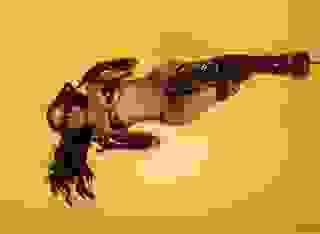Note: You can change font size, font face, and turn on dark mode by clicking the "A" icon tab in the Story Info Box.
You can temporarily switch back to a Classic Literotica® experience during our ongoing public Beta testing. Please consider leaving feedback on issues you experience or suggest improvements.
Click hereCalcutta was reached at seven in the morning, and the packet left for Hong Kong at noon; so that Phileas Fogg had five hours before him.
According to his journal, he was due at Calcutta on the 25th of October, and that was the exact date of his actual arrival. He was therefore neither behind-hand nor ahead of time. The two days gained between London and Bombay had been lost, as has been seen, in the journey across India. But it is not to be supposed that Phileas Fogg regretted them.
The train entered the station, and Passepartout jumping out first, was followed by Mr. Fogg, who assisted his fair companion to descend. Phileas Fogg intended to proceed at once to the Hong Kong steamer, in order to get Aouda comfortably settled for the voyage. He was unwilling to leave her while they were still on dangerous ground.
Just as he was leaving the station a policeman came up to him, and said, "Mr. Phileas Fogg?"
"I am he."
"Is this man your servant?" added the policeman, pointing to Passepartout.
"Yes."
"Be so good, both of you, as to follow me."
Mr. Fogg betrayed no surprise whatever. The policeman was a representative of the law, and law is sacred to an Englishman. Passepartout tried to reason about the matter, but the policeman tapped him with his stick, and Mr. Fogg made him a signal to obey.
"May this young lady go with us?" asked he.
"She may," replied the policeman.
Mr. Fogg, Aouda, and Passepartout were conducted to a palkigahri, a sort of four-wheeled carriage, drawn by two horses, in which they took their places and were driven away. No one spoke during the twenty minutes which elapsed before they reached their destination. They first passed through the "black town," with its narrow streets, its miserable, dirty huts, and squalid population; then through the "European town," which presented a relief in its bright brick mansions, shaded by coconut-trees and bristling with masts, where, although it was early morning, elegantly dressed horsemen and handsome equipages were passing back and forth.
The carriage stopped before a modest-looking house, which, however, did not have the appearance of a private mansion. The policeman having requested his prisoners for so, truly, they might be called-to descend, conducted them into a room with barred windows, and said: "You will appear before Judge Obadiah at half-past eight."
He then retired, and closed the door.
"Why, we are prisoners!" exclaimed Passepartout, falling into a chair.
Aouda, with an emotion she tried to conceal, said to Mr. Fogg: "Sir, you must leave me to my fate! It is on my account that you receive this treatment, it is for having saved me!"
Phileas Fogg contented himself with saying that it was impossible. It was quite unlikely that he should be arrested for preventing a suttee. The complainants would not dare present themselves with such a charge. There was some mistake. Moreover, he would not, in any event, abandon Aouda, but would escort her to Hong Kong.
"But the steamer leaves at noon!" observed Passepartout, nervously.
"We shall be on board by noon," replied his master, placidly.
It was said so positively that Passepartout could not help muttering to himself, "Parbleuthat's certain! Before noon we shall be on board." But he was by no means reassured.
At half-past eight the door opened, the policeman appeared, and, requesting them to follow him, led the way to an adjoining hall. It was evidently a court-room, and a crowd of Europeans and natives already occupied the rear of the apartment.
Mr. Fogg and his two companions took their places on a bench opposite the desks of the magistrate and his clerk. Immediately after, Judge Obadiah, a fat, round man, followed by the clerk, entered. He proceeded to take down a wig which was hanging on a nail, and put it hurriedly on his head.
"The first case," said he. Then, putting his hand to his head, he exclaimed, "Heh! This is not my wig!"
"No, your worship," returned the clerk, "It is mine."
"My dear Mr. Oysterpuff, how can a judge give a wise sentence in a clerk's wig?"
The wigs were exchanged.
Passepartout was getting nervous, for the hands on the face of the big clock over the judge seemed to go around with terrible rapidity.
"The first case," repeated Judge Obadiah.
"Phileas Fogg?" demanded Oysterpuff.
"I am here," replied Mr. Fogg.
"Passepartout?"
"Present," responded Passepartout.
"Good," said the judge. "You have been looked for, prisoners, for two days on the trains from Bombay."
"But of what are we accused?" asked Passepartout, impatiently.
"You are about to be informed."
"I am an English subject, sir," said Mr. Fogg, "and I have the right—"
"Have you been ill-treated?"
"Not at all."
"Very well; let the complainants come in."
A door was swung open by order of the judge, and three Indian priests entered.
"That's it," muttered Passepartout; "these are the rogues who were going to burn our young lady."
The priests took their places in front of the judge, and the clerk proceeded to read in a loud voice a complaint of sacrilege against Phileas Fogg and his servant, who were accused of having violated a place held consecrated by the Brahmin religion.
"You hear the charge?" asked the judge.
"Yes, sir," replied Mr. Fogg, consulting his watch, "and I admit it."
"You admit it?"
"I admit it, and I wish to hear these priests admit, in their turn, what they were going to do at the pagoda of Pillaji."
The priests looked at each other; they did not seem to understand what was said.
"Yes," cried Passepartout, warmly; "at the pagoda of Pillaji, where they were on the point of burning their victim."
The judge stared with astonishment, and the priests were stupefied.
"What victim?" said Judge Obadiah. "Burn whom? In Bombay itself?"
"Bombay?" cried Passepartout.
"Certainly. We are not talking of the pagoda of Pillaji, but of the pagoda of Malabar Hill, at Bombay."
"And as a proof," added the clerk, "here are the desecrator's very shoes, which he left behind him."
Whereupon he placed a pair of shoes on his desk.
"My shoes!" cried Passepartout, in his surprise permitting this imprudent exclamation to escape him.
The confusion of master and man, who had quite forgotten the affair at Bombay, for which they were now detained at Calcutta, may be imagined.
Fix the detective, had foreseen the advantage which Passepartout's escapade gave him, and, delaying his departure for twelve hours, had consulted the priests of Malabar Hill. Knowing that the English authorities dealt very severely with this kind of misdemeanor, he promised them a goodly sum in damages, and sent them forward to Calcutta by the next train. Owing to the delay caused by the rescue of the young widow, Fix and the priests reached the Indian capital before Mr. Fogg and his servant, the magistrates having been already warned by a dispatch to arrest them should they arrive. Fix's disappointment when he learned that Phileas Fogg had not made his appearance in Calcutta may be imagined. He made up his mind that the robber had stopped somewhere on the route and taken refuge in the southern provinces. For twenty-four hours Fix watched the station with feverish anxiety; at last he was rewarded by seeing Mr. Fogg and Passepartout arrive, accompanied by a young woman, whose presence he was wholly at a loss to explain. He hastened for a policeman; and this was how the party came to be arrested and brought before Judge Obadiah.
Had Passepartout been a little less preoccupied, he would have espied the detective ensconced in a corner of the court-room, watching the proceedings with an interest easily understood; for the warrant had failed to reach him at Calcutta, as it had done at Bombay and Suez.
Judge Obadiah had unfortunately caught Passepartout's rash exclamation, which the poor fellow would have given the world to recall.
"The facts are admitted?" asked the judge.
"Admitted," replied Mr. Fogg, coldly.
"Inasmuch" resumed the judge, "as the English law protects equally and sternly the religions of the Indian people, and as the man Passepartout has admitted that he violated the sacred pagoda of Malabar Hill, at Bombay, on the 20th of October, I condemn the said Passepartout to imprisonment for fifteen days and a fine of three hundred pounds."
"Three hundred pounds!" cried Passepartout, startled at the largeness of the sum.
"Silence!" shouted the constable.
"And inasmuch" continued the judge, "as it is not proved that the act was not done by the connivance of the master with the servant, and as the master in any case must be held responsible for the acts of his paid servant, I condemn Phileas Fogg to a week's imprisonment and a fine of one hundred and fifty pounds."
Fix rubbed his hands softly with satisfaction; if Phileas Fogg could be detained in Calcutta a week, it would be more than time for the warrant to arrive. Passepartout was stupefied. This sentence ruined his master. A wager of twenty thousand pounds lost, because he, like a precious fool, had gone into that abominable pagoda!
Phileas Fogg, as self-composed as if the judgment did not in the least concern him, did not even lift his eyebrows while it was being pronounced. Just as the clerk was calling the next case, he rose, and said, "I offer bail."
"You have that right," returned the judge.
Fix's blood ran cold, but he resumed his composure when he heard the judge announce that the bail required for each prisoner would be one thousand pounds.
"I will pay it at once," said Mr. Fogg, taking a roll of bank-bills from the carpet-bag, which Passepartout had by him, and placing them on the clerk's desk.
"This sum will be restored to you upon your release from prison," said the judge. "Meanwhile, you are liberated on bail."
"Come!" said Phileas Fogg to his servant.
"But let them at least give me back my shoes!" cried Passepartout angrily.
"Ah, these are pretty dear shoes!" he muttered, as they were handed to him. "More than a thousand pounds apiece; besides, they pinch my feet."
Mr. Fogg, offering his arm to Aouda, then departed, followed by the crestfallen Passepartout. Fix still nourished hopes that the robber would not, after all, leave the two thousand pounds behind him, but would decide to serve out his week in jail, and issued forth on Mr. Fogg's traces. That gentleman took a carriage, and the party were soon landed on one of the quays.
TheRangoonwas moored half a mile off in the harbour, its signal of departure hoisted at the mast-head. Eleven o'clock was striking; Mr. Fogg was an hour in advance of time. Fix saw them leave the carriage and push off in a boat for the steamer, and stamped his feet with disappointment.
"The rascal is off, after all!" he exclaimed. "Two thousand pounds sacrificed! He's as prodigal as a thief! I'll follow him to the end of the world if necessary; but, at the rate he is going on, the stolen money will soon be exhausted."
The detective was not far wrong in making this conjecture. Since leaving London, what with traveling expenses, bribes, the purchase of the elephant, bails, and fines, Mr. Fogg had already spent more than five thousand pounds on the way, and the percentage of the sum recovered from the bank robber promised to the detectives, was rapidly diminishing.
TheRangoon— one of the Peninsular and Oriental Company's boats plying in the Chinese and Japanese seas—was a screw steamer, built of iron, weighing about seventeen hundred and seventy tons, and with engines of four hundred horse-power. She was as fast, but not as well fitted up, as theMongolia, and Aouda was not as comfortably provided for on board of her as Phileas Fogg could have wished. However, the trip from Calcutta to Hong Kong only comprised some three thousand five hundred miles, occupying from ten to twelve days, and the young woman was not difficult to please as she had the opportunity to spend considerable time with the delightful Mr. Phileas Fogg.
During the first days of the journey Aouda became better acquainted with her protector, and constantly gave more and more evidence of her deep gratitude for what he had done.
The phlegmatic gentleman listened to her, apparently at least, with coldness, neither his voice nor his manner betraying the slightest emotion; but he seemed to be always on the watch that nothing should be wanting to Aouda's comfort. He visited her regularly each day at certain hours, not so much to talk himself, as to sit and hear her talk. He treated her with the strictest politeness, but with the precision of an automaton, the movements of which had been arranged for this purpose.
Aouda did not quite know what to make of him, though Passepartout had given her some hints of his master's eccentricity, and made her smile by telling her of the wager which was sending him round the world. After all, she owed Phileas Fogg her life, and she always regarded him through the exalting medium of her gratitude.
Then one particular evening with Fogg sitting beside her in the cabin, Aouda began to weep.
Fogg was immediately alarmed. "'Don't cry, my dear," he said. "You have been badly abused. But when we reach Hong Kong I shall present you with a goodly sum of money . . . enough to tide you over for a year or so."
Once again I must intervene in Mr. Verne's text to add some mention of my own, shall I say, private encounter with Aouda. I recall vividly what was said – and what occurred, and have done my utmost to convey the words and emotions of that moment in time to the written word. That I have failed miserably is most obvious, but I have done my best.
"Oh my dear, dear, Mr. Fogg, you are so very kind. May I bestow a simple kiss upon you?"
"A kiss?"
"A kiss, yes, in return for the great kindness you have shown me. And for that magnificent rescue from being burned alive."
"You may indeed," I replied and felt myself stiffening. I was of course enamored of Aouda, who was indeed a most beautiful woman, perhaps the most beautiful woman I had ever beheld.
She closed her eyes and waited for me to kiss her. It took me a minute before it occurred to me that she was actually waiting for me, and then my lips softly brushed against hers. The kiss set us both aflame. And in an instant the kiss became two kisses and then Aouda opened her mouth a little and my tongue was probing at its entrance. I was taken aback when she yielded so easily. But when her tongue returned my ardor my hand went to her leg.
"What lovely limbs you have, how firm your flesh is, you are delicious," I gasped as the kiss ended.
"Do you intend to take . . . certain liberties with me, Mr. Fogg?"
I found myself confessing that, "I . . . I should like to bed you, Aouda. I am aware you are no longer a virgin, that in fact, you are a married woman and . . . . "
"A widower, Mr. Fogg," she said and her tone was throaty and rich with alluring enticement. She did not think it necessary to inform me that her virginity had been taken by my manservant, Passepartout.
"Have you ever had champagne?" I inquired, having felt a strong need to slake my parched throat.
"No I haven't, but I have heard it has these remarkable little bubbles that tickle one's nose. Is that true, sir?"
"Indeed it is. Wait here a moment and I shall fetch us a bottle or two."
"Wait!" Aouda cried out as rose to make my leave.
"Yes?" I said, pausing at the door of the compartment.
"Please, one last kiss before you depart," she said and I was certain I saw a tear in her eye.
"Of course, Aouda, one last sweet kiss before I depart."
And we embraced for the first time, her breasts bearing down on my chest; my cock, a small pike, rammed into her loins. She moved her hips a certain way and I found myself centered on her cunt and made to pull away for fear of alarming her with my hardness. But she followed my movement, maneuvering herself until I was centered on her once more. I was gone but a fleeting moment, but it seemed an eternity to me.
Aouda had never tasted champagne and she delighted the both of us with her exuberance as she quaffed her first glass. My sexual lethargy had vanished. All the years of self enforced celibacy were suddenly forgotten. After the second glass, Aouda became giddy and could hardly refrain from laughing at everything I said. We enjoyed another series of kisses, with me gradually moving down her neck to the hollow of her throat, which I proceeded to lick feveredly.
Giddy or not, Aouda remembered to continue the pretext of innocence with me. "Oh, Mr. Fogg! That tickles!"
"Really? And how does this feel?" I inquired, nibbling at her earlobe.
"I fear I shall lose control of my senses, Mr. Fogg. This is causing all sort of tingling, you know."
"Tingling, you say?"
"Yes."
"Where exactly?"
"Oh, dare I say it? My breasts for one," then she giggled inanely.
"Care to mention another part of your anatomy that's tingling?" I asked, my face scant inches from hers.
"Mr. Fogg! Really, I hardly know you! But you did save my life, and I am eternally grateful for it. So . . . if you ask me again I shall answer you."
My erection was about to burst through the confines of my now bulging trousers.
"I fear . . . I must ask, where then is the other tingling coming from?"
Aouda put her lips to my ear and whispered. "In my cunny, Mr. Fogg, 'tis my cunny that's all a tingle."
Then her hands were on my crotch, lightly touching my erection.
"What!" I blurted.
"I know you care for me!" Aouda laughed gleefully.
"Of course I care for you," I managed to say then lost my voice as her busy fingers extracted his hardon from within the tight confines of his trousers.
"Good God Al . . ." I began; then stopped for Aouda had pulled herself closer to my mid-section and lowered her mouth engulfing the head of my wildly throbbing prick with her mouth and tongue.
Aouda began to hum as she sucked. Some days later she would reveal to me that as she hummed, she was reflecting on the variances in size between that Passepartout and myself with regard to our respective shafts. She was laughing throughout her description, but suffice to say, she found Passepartout slightly longer than me. Other than that we were quite similar, at least as regards our respective pricks.
She brought my throbbing prick to a new level of erectness as her tongue played with the very tip. She tried to tease me but soon felt my legs and feet twitching nervously and knew I was about to spend.
Aouda contented herself with merely sucking softly on the head of my prick and was not repulsed when my spunk splattered the entirety of her mouth. In fact, she swallowed most of it although I doubt she took any particular joy in it. But as she would tell me later, I her special hero, and so she kept swallowing, drawing the remainder of my spend right out of me.
She continued to fellate me even as I shrank in her mouth. Only when I groaned and pleaded with her to release me did she back away and rise to her feet.
"No, no!" I cried out. "Come lie with me! I must explore your divine form with my hands and my mouth. I must pay homage to you as you have to me."
Aouda felt a dampness growing between her legs as my eyes beseeched her.
Her breathing rate increased and she started to strain against the constraints of her corsets.
"A minute, please," she whispered and scrambled to free herself of all encumberments, save her veil, tiara and purple top which didn't cover her breasts, but wore under her sari for warmth. I stood up and strode over to her.
Without saying a word, I picked her up and sat her down on the center of the table. Seeing that my cock had returned to rock hardness Aouda lay back on the table; her legs spread, leaving herself open to him. Breathing hard, Fogg leaned over her and rubbed his steely prick against her moist quim. Aouda moaned with heightened anticipation. In a short space of time, she had been widowed, lost her virginity and was about to be taken carnally by her second lover in as many days.








